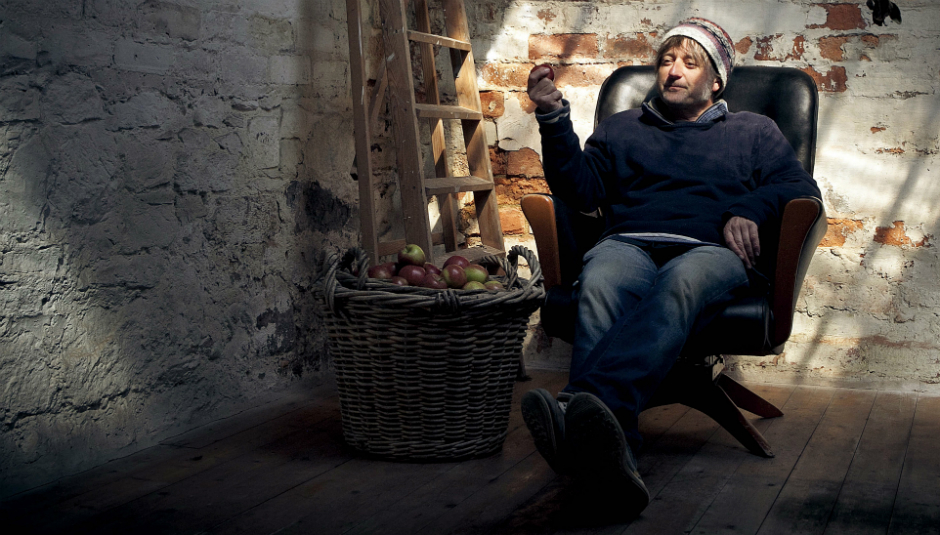In a career spanning 20 years and 60 albums, King Creosote is a rare example of an artist who has both critical success and industry longevity. His latest release, Astronaut Meets Appleman is the follow up to the critically acclaimed From Scotland with Love and the Mercury nominated Diamond Mine, his collaborative 2011 project with Jon Hopkins. Given his prolific output (he has written over 800 songs) it’s no surprise when I speak to KC – aka Kenny Anderson – up in his native Fife that he is already planning his next record. “Weirdly, I still feel like every album is a stepping stone. I’m still not at the point where I feel I’m at the last record. We’re still on the way to somewhere. Already now I’m thinking: what am I going to do next recording wise? I’m already talking to the band about how we can make a record that isn’t Astronaut Part 2.”
Astronaut Meets Appleman explores the conflict and cohesion between technology and tradition, digital and analogue, old and new. Gone are expensive multi-takes and rehearsals, replaced instead with a live, busker-style approach to writing and recording with his band. “They’re such a good band live, studio wise too” says Anderson. “They’re all so keen and they love the songs. There’s not the luxury these days of going into the studio and recording for three weeks. I don’t know, maybe Coldplay do that. For us, you’re arriving, you’re hearing this for the first time, and then we’re going to have two takes at most and we’ve just got to get it done. I’ve started to do this thing in live sets too where I just play them a brand new song, one that’s hardly written and one they’ve never heard before. They have to think on their feet and just join in; in the midst of that, it all kind of self-arranges. The result is often brilliant. But we don’t have an endless budget. We’re making records cheaper and cheaper – we play something live and that’s it.”
A 60-album back catalogue must surely lead to greater confidence when it comes to ad-libbing? “They’ll be lines I cringe over. Lines that I could have said better or more intelligently. In the past, I probably would have ironed them out. I’d have gone back and changed them all but I’ve stopped myself doing that now. I just have to be as instantaneous as everybody else that’s played on the record. You have to be as good. And I’m not as good. That’s the thing. Technically, I’m the worst musician in the band. If there’s any mistakes made in the live set, I make them. I’ll have the capo in the wrong place, I’ll go into the wrong chord or I’ll forget a chorus. I just have to say, hey, I’ve done 800 songs, I get muddled up!”
The self-depreciation continues; he seems genuinely baffled by the success of his new album when I ask him about positive early responses. “I am really surprised by the reaction to the album – I can’t believe it. You hope for this with every record; Diamond Mine got amazing criticism and it was helped by Jon Hopkins and connections and all of that. Then there was From Scotland with Love which was helped by an accompanying film. My collaborations with The Earlies have also been a huge success. I think sometimes that I get this ‘how to be successful’ thing now but this particular record is just me on my own again – no collaborations, no film, just me. There’s no other story, nothing else to pin this record on, and I was ready for everyone to go: ‘Oh, what a disappointment!’”
Anderson’s apprehension seems to come from his longing for a pre-internet world without social media gimmicks or below the line comments, both of which seem to have profoundly affected the way he makes and thinks about music. “A record and a band are just not enough these days. You need to always have bells and whistles on everything or a gimmicky selling point like so and so are giving away their album, you decide how much you are going to spend on it. Why is a record by a band not enough anymore? The record company were like: ‘It’s not sensational enough anymore Kenny. We need a back-story. We need you to go into the woods and lose half a hand by paragliding or something. Where’s the story? We need a story!’ The simple truth is, I went into a studio with my wonderful band and we put it together – that’s it. I do hark back to a life pre-internet. Like I’m not on Facebook, Twitter, any of it. The last thing you need is to start living your life where you feel you’re constantly being monitored – it actually changes what you do in your life, recording, and performance. We’ve tried in events I run to have a no-phones policy because it does change things. Before we’ve even packed up our cases and gotten back in the van, somebody in the band will have gone online and will be reading comments about what happened at the gig, before we’ve even had time to assimilate what did actually happen ourselves. The memory of that gig for some fans too is hindered – they weren’t actually in the room at the time because they’re looking through a screen at the gig.”
I ask him what effect this has on the performance itself. “It does make me put on a very different show. I end up not saying things in between songs – I don’t want to be that guy who came out with this or that or whatever. The hardest thing these days is to just be yourself. It’s getting more difficult because people comment on your performances all of the time.” Unlike many younger bands Anderson, who is soon to be 50, has seen success pre- and post-social media and it’s clear he feels it’s done more harm than good to artists. “People put on events and think they’re going to be huge because it has so many likes. But it’s really easy to like in the digital realm; in my experience, that hardly ever equates into ticket sales. Jon Hopkins and I found this out when we went to America to do a little tour of Diamond Mine. We insisted on tiny venues – a hundred absolute max – but everyone went mad. They were like: ‘What are you thinking? You’ve been Mercury nominated, you’re this, you’re that.’ Turns out we didn’t even half fill those venues. One of the label representatives came with us, crestfallen. ‘I don’t understand – look at all this digital press and likes and I’m attending notifications.’ Everyone was bewildered, wondering what had gone wrong. For me, they’d forgotten the traditional ways of getting people into gigs – local record shops promoting the show, word of mouth, flyers etcetera, which were more successful.”
With the onset of Periscope, I wonder how he feels this will affect smaller independent acts just starting out compared to his own debut twenty years ago. “It’s a hideous idea. Where does that ultimately end up? No one will come to live gigs anymore, choosing to watch on their arses at home! This whole astronaut meets appleman thing – it’s like we’re all constantly reaching for this life that out there in the universe, this big life, but we’re actually missing out on it because we’ve forgotten the basics. We’re too busy clicking, liking, or watching a gig through a mobile phone.”
“I went through my Spotify stats a couple of years ago as I was trying to work out when I would get my £100 in royalties. Well, it would take a hundred and thirty-five years at the rate I get paid from them! When I tell fans that they have no idea, and realise they’re actually putting the nail in the coffin of smaller artists. But it needs more bands to come out and say that. Bands coming up have got little chance these days. They’re all doing jobs and having to spend their savings on making music.”
Periscope and the like have forced Anderson to reconsider the way he performs live. “To keep people coming back to the shows, it has to be constantly evolving”, he says. “As your performances are beamed around the world before you’ve even got back in the van, you’re already thinking: ‘What did we do? What could we change?’ I never write a set list and the band have just had to get used to it, that I can go off on one. So if you miss the performance, you miss the performance. People expect set-list repetition gig after gig and I just don’t do that. If people don’t support these things now, they’re going to really miss them when they’re gone. And it works – people see the reasoning and they get it. We’re doing a tiny gig and it’s at a loss, everybody is doing it for reduced wages. The thing sells out but suddenly the tickets are on sale online for ten times the original value. So already, somebody, even if they just sell one ticket, is already making more out of that gig than any of us who are actually putting the gig on. It’s sick because it’s basically killing the live thing now for artists because many bands aren’t touring because they can’t afford to.”
He adds: “I’m pushing the value of my work more towards an artistic thing: different editions of the record made with my own hand artwork and self-made tickets for example. In this digital age the record company are also sending me 400 prints to hand sign and send them back. My signature is pretty simple but it needs to be – can’t they just make me a stamp?!” Right on cue, Anderson’s doorbell rings and he needs to break off our interview momentarily to accept the delivery of 400 records which he needs to sign and prepare. He later tells me about designing record sleeves to order from fans and carefully distributing his albums at certain outlets. “I’ve now got people buying multiple copies because they want the really unique ones.”
The opening to Astronaut Meets Appleman, ‘You Just Want’, sets out the stall for the entire album. At seven minutes long, it’s described as a piece of hymnal drone-pop, its touchstones being the art of patience, scenes of mild bondage and Venus (in Furs). “Some interviewer asked if I’m into S&M,” he says, laughing loudly. “Well, no.” I scribble out my next question and hastily move on. He tells me songs in the first person are never about him. “If you’re gonna play Astronaut meets Appleman to the end, you have to get ‘You Just Want’. If you’re somebody who can’t be arsed with it for whatever reason, or you skip it, well it’s not the record for you. I learned that from Hopkins. He was like: ‘If folk can’t get through that intro, it’s not the record for them and you have to take it on the chin that folk don’t like it.’ You’ve got to draw people in, you’ve got to hook the ones who do really want to hear it and want to listen to it again, the ones who want to spend time on it and actually get the record.”
Anderson is eager to emphasise the conflict he has between tradition and modernity. “The opening track was all done analogue. It was live as I wanted to get back to the days when I had a bluegrass band where every instrument gets a little turn up at the mic. I started out in a bluegrass band and I loved the rawness of it. We rolled up and performed with one case, no amplifiers, yet there was a beauty in its simplicity. With another track, ‘Betelgeuse’, digital and analogue play a part; we recorded part modern technology, part tape, all the while exploring the conflict between the two. The song is very ethereal. It’s like a grimy earth existence of heading out into space or the unknown. It gets more star like as it goes on.”
The Scottish landscape has always been a source of positive inspiration to Anderson, but Astronaut meets Appleman has a much darker feel, one tinged with a sense of loss. “I try to concentrate on what’s still left of the landscape” he tells me, annoyed that much of the landscape that has inspired his work has been destroyed. “It’s definitely making my songs more nostalgic than maybe they were.” The second track on the album, ‘Melin Wynt’ (Welsh for windmill), explores the loss of this landscape in more detail. “We were on our way to Festival Number 6 and we stopped off for a break. I saw a sign ‘Melin Wynt’ and thought it would be cool to see a windmill. In my head it was an old Dutch clappity thing with sails. But no, I turn around and there’s this regiment of ugly wind turbines destroying the beauty of the landscape – it was like something from War of the Worlds, Dalek-esque!”
It is perhaps no wonder then than Anderson finds solace in looking back to his youth and focusing on the innocence of his young daughter, Louie Wren, who also makes an appearance on the album in ambient reverie ‘Peter Rabbit Tea’. “Beth, my elder daughter was all over the first record I did for Domino and I thought y’know, new daughter, this harking back to an earlier me, a younger me, so I wanted to bring styles back from the past. It was good back then and there was something good in all that naivety.” I ask him if turning 50 soon has anything to do with the nostalgic feel of the album. “The whole theme of the album is harking back to better days...have I done the right thing? Have I made the right choices? I’m going to hit 50 soon, a milestone, and all these questions are certainly in the album, maybe not explicitly, but they’re definitely a backdrop to the songs.”
This milestone has also seen Anderson return to his extensive back catalogue. “I constantly recycle songs. Now and again I go through my song books playing songs that I don’t play live or that I’ve forgotten about. The other thing I do is go really far back and pick out former ugly duckling songs because that’s what Diamond Mine taught me. People go on about ‘Running on Fumes’ and how good that was. That was on the record before and not a single person pulled that one out as a highlight. It was just sitting there, but reworked in a different space, it worked. Fans play a part too, requesting songs I’ve forgotten about!” I ask him if having so many songs makes it difficult to choose songs for his live sets. “It’s actually quite easy because I get fed up of songs really easy, I just can’t face them anymore! I’m not in that space so just need to move on, but I know their time will come around again.”
His sense of reflection also gives the album its title. “My daughter had this little astronaut toy in her hand and it was the ultimate in uber-design – the pinnacle of toy design, all safe and pleasing to the eye. Then she had this organic apple that had an extra bit which looked a bit like a head. Jen, Louie’s mum, put some sticks in it and made a little man out of it. She was more taken with appleman in terms of a plaything than the astronaut. Kids would be just as happy with that as with some uber-toy. My elder daughter constantly has a phone in her hand. I feel like it’s my generation’s duty to tell them how much better it was when we were growing up, when things were simpler. With this album, I really am debating if I am the astronaut or the appleman.”
Astronaut Meets Appleman is out on 2 September on Domino Records.






















